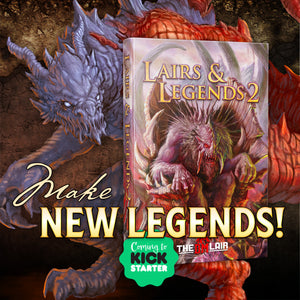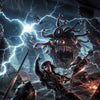9 Secrets to Becoming a Great Dungeon Master

Written by Luke Hart
Many people look at Matt Mercer’s amazing success as a dungeon master and wonder how he does it. And let’s forget about the voice acting for a moment. Yes, he’s an incredible voice actor, but let’s set that aside. The fact remains that he is an outstanding dungeon master.
So, what is the secret to his success as a DM? How does he run such spectacular games? After all, if we only knew what his secret is, we could all run amazing games, too, right?
Well, allow me to unveil the secret of his secret: HE HAS NO SECRET.
I submit to you that Matt Mercer and other pro DMs are open books. Their only real “secret” is that they are exceptionally good at the BASICS of being a dungeon master. And if you and I can begin to master these basics, our games can begin to approach the awesomeness that is a Critical Role game.
THESE are the basics that pro DMs, such as Matt Mercer, excel at.
By the way, are you a NEW GAME MASTER feeling a bit overwhelmed by everything involved with running a role-playing game? If so, the Secret Art of Game Mastery can help. Get over 100 years of GM experience distilled into practical, easy-to-read advice.
Watch or listen to this article by clicking the video below.
#1 Preparation
Some of the very worst games I’ve played in or heard other players tell me about were run by dungeon masters who didn’t prepare enough. This is how you recognize these games: not a whole lot happens, or it happens very slowly, because the DM is busy looking things up in the book, figuring out encounters and NPCs on the fly, or just staring at the players asking them what they do…even though the DM has given them ZERO INFORMATION and ZERO PLOT HOOKS.
Now, sometimes this is because the DM intentionally didn’t prep much because they relied on their improvisation skills instead. I know because low-prep DMs often boast about not needing to prep because they are such great improvisers…which may or may not be true. Other times it’s because the DM is just lazy and decides to wing it during the game. Other times it’s because the DM is legitimately busy with real life stuff – job, family, etc. – and doesn’t have much time to prep.
This is the hill I will die on: a game you spend MORE time preparing for will almost always be better than a game you spend LESS time preparing for. And that also applies to dungeon masters who are actually good at improvising at the game table.
Do you think Matt Mercer wings all of his games? Or do you think he prepares extensively, and then improvises when needed? I guarantee you it is the latter.
Preparation is a basic skill. Even though I’ve been running D&D games since the 90s, nearly 30 years, I prepare for my games almost as much today as I would previously. And the only reason I prep less RIGHT NOW is that I’m also running a YouTube channel and a full-blown business which leads to really long work hours.
Now, I give very little slack to lazy dungeon masters who just don’t want to prep or those who claim to be great at improvising their games but actually suck at it – and by the way, sometimes these are one and the same. However, busy dungeon masters – that’s quite a different story and completely understandable. And that’s one of the reasons my team and I publish Lair Magazine for DM Lair patrons. It gives dungeon masters a variety of professionally made, easy-to-use resources that they can drag and drop into their ongoing campaigns: adventures, new monsters, digital maps, traps, puzzles, and more. You see, the resources we publish in Lair Magazine help busy dungeon masters reduce the prep time they need to still run amazing games for their players.
#2 Treating Players Fairly
A great DM ensures fairness in their games. This means rooting for the players to overcome challenges, being impartial when adjudicating rules, and avoiding behavior that comes off as mean-spirited or antagonistic.
Key Practices:
- Know the Rules: Familiarity with the rules helps you make fair decisions on the fly.
- Player Agency: Let players control their characters without undue interference.
- When in Doubt: Roll a die to make impartial rulings.
Even the best DMs, like Matt Mercer, are rooting for their players, despite the tough challenges they present. And yes, PC deaths can still happen—it’s part of the game, especially in a world filled with monsters and fireballs.
#3 Designing Good Adventures
Pro dungeon masters excel at designing good adventures that their players enjoy. Now, I have lots of videos on my channel about designing good D&D adventures and all the different elements that go into an adventure – encounters, traps, NPCs, etc. – and I talk about how to balance adventure around the three pillars – combat, exploration, and social interactions – so, I’m not going to rehash all of that here. My point is that cool, enjoyable adventures form the BACKBONE of the game; and if you don’t have them in your games, your D&D sessions will probably suck.
Now, designing a good adventure takes TIME, and the more experienced you are as a DM, the better the adventure you design is going to be. So, I have two points. First, when you’re first starting out as a DM, your adventures might not be that good, and that’s okay. Just stick with it and work on making each adventure a little better. Second, if you’re not willing or able to put in the TIME to create adventures to begin with – see my first point about preparation – instead of trying to homebrew your adventures, you’re better off buying a pre-made module to run. For instance, you might pick up Rime of the Frost Maiden or Descent into Avernus. However, if you don’t want to run a module, but instead want adventures you can drag and drop into an ongoing campaign, my suggestion is to become a DM Lair patron and get Lair Magazine. Every monthly issue contains 2 to 3 easy-to-use adventures complete with digital maps for online play.
By the way, I put together this playlist for you of my best videos on adventure creation to help you out: D&D Adventure Creation.
#4 Balancing the Game
Excellent dungeon masters balance the game, especially the adventure they create, around the three pillars: combat, exploration, and social interactions. Include elements of each in a game – don’t run lopsided games that ignore certain pillars.
Now, one might criticize broadcasted games for focusing too much on social interactions – that’s the talky talky between characters and NPCs – but we must also recognize that they are running a show to entertain the viewers, and many of them are actors and voice actors, so this shouldn’t surprise us. However, we do see the three pillars in their games; it isn’t all talky-talky. There is certainly combat and exploration present.
By the way, I have a video titled The 3 Pillars of a Successful D&D Game that goes into more detail on this.
#5 Customizing the Game for Your Players
We just talked about balancing the game; but a complimentary point is to balance according to your player’s preferences. Love combat? More combat. Love social interactions; add more.
And you know, part of me suspects that one of the reasons we see lots of social interactions on Critical Role is that Matt is doing just this, customizing the game for his players. I bet you that the players really do enjoy acting and talking in character a lot. So, this becomes a feature of Matt’s games for them.
Another pro tip for you: Using the characters’ backstories to design elements in your game is something you can do that your players will LOVE. In my D&D Campaign Creation video, I talk about the main adventure arc for your game, but I also discuss character adventure arcs, and that’s where you can design entire adventures that revolve around elements in character backstories. I strongly suggest doing that when you can as it will make your campaign even more engaging for your players.
Caution that not all your players will all like the same things, though. So, some variety is still needed. And all of one thing (combat, for instance) could get old and boring, even if players love it.
Most of the things we’ve talked about thus far have to do with preparing the game outside of the actual game session – see what I mean about preparation being important? However, how you run the game during the game session is another basic that, when done well, will elevate your game from others. Now, there are LOTS of things a DM does during a game session, but I’m going to list a few that I consider most important.
#6 Listening More and Talking Less
Yes, you need to describe the world around the characters. Yes, you need to adjudicate actions when the players decide to do a thing. However, you also need to just shut your mouth, let the players talk, and listen to them! The goal is not to put YOURSELF in the spotlight. Instead, allow everyone to share the spotlight, players and dungeon master.
This is something we certainly see Matt Mercer doing. He gives his players room to speak, to act, to actually play the game. We aren’t just listening to him monologue for several hours.
#7 Run Interesting NPCs
A good chunk of the game is the characters talking to NPCs – either in the dungeon or adventure locations, in town, on the road or elsewhere – and remember that monsters and bad guys are NPCs, too! – so strive to make your NPCs interesting. Sometimes this involves their background or secrets they may have, but in my experience, 90% of making an NPC interesting and fun for players is HOW YOU PROTRAY THEM during the game. It’s the quirky or unique voice you give them. It’s the body language you demonstrate as you roleplay the NPC.
Honestly, this is probably the one thing that Matt Mercer excels at above all others. And it shouldn’t surprise us since his vocation is as an actor. Voice actors are just as much actors as non-voice actors, too, by the way. They just act more with their voices and less with their bodies.
#8 Run Fun Combats
Another part of the game that can easily take up 50% or more of your actual game time is combats. And if they are going to take up that much time, they had better be fun. However, combat can often feel like a chore and be a complete slog, and you definitely don’t want THAT!
Now, I have a WHOLE LOT I could say on this topic, but I’ve also made several videos about it, too. You can find them in this playlist: Improving D&D Combat.
#9 Allow All Players to Participate
Making sure all players have the opportunity to participate and dominant players don’t hog the action is a fairly basic but super important role the DM plays. Guess what happens if you as the DM don’t quiet down the loud talkative players so that everyone can actually play the game? Chances are the players who aren’t able to participate much might just leave and find other games. Why? Because they showed up to play D&D, but they really aren’t able to. It’s the DM’s job to create space for them to participate. Sometimes that’s as simple as addressing the quiet players and asking them what they say or do. Other times it means addressing the talkative players directly and asking them to give others a chance to speak.
100 Years of GM Experience at Your Fingertips!
Are you a NEW GAME MASTER feeling a bit overwhelmed by everything involved with running a role-playing game? Are you a VETERAN GAME MASTER looking for new tips and tricks to take your games to the next level? Look no further than the Secret Art of Game Mastery.
We at the DM Lair have distilled our CENTURY of accumulated GM experience into an easy-to-read guide of practical advice that you can immediately apply to your games! We've even included our own templates–the things that we use to prepare our ACTUAL games.
Get all three books to master your game:
- The Secret Art of Game Mastery. Contains over 100 years of GM advice distilled into an easy-to-read format. It introduces and explains the tools of the trade, scheduling, playstyle, post-game notes, getting player feedback, and more.
- The Secret Art of Preparation. Brings to your fingertips the actual templates and guides that the DM Lair team uses to prepare games, Lair Magazine, and more. Designed as a three-ring binder, it's intended for you to write directly into for your entire campaign!
- The Secret Art of Notetaking. Gives you the keys to tracking your campaign from session to session just like the DM Lair team. Designed as a three-ring binder, it's intended for you to write in and keep track of your whole campaign!
With so much knowledge and experience on its pages, The Secret Art of Game Mastery is guaranteed to become an indispensable tool for all game masters, new and veteran alike. And if that isn’t enough, the information applies to all game systems and all genres!
-
Posted in
Game Master How-To Articles







